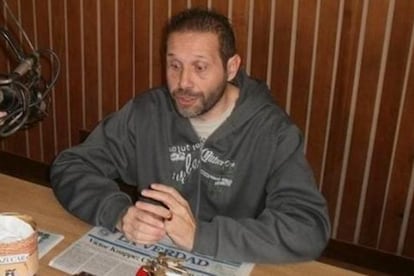Spying scandal taints Argentina’s presidential elections
The arrest of a former police officer who illegally surveilled over 1,000 politicians, judges and civic leaders stings the ruling party less than two weeks before polls open


A former police officer detained for five months on charges of spying on two judges has been linked to a massive illegal surveillance operation in Argentina. According to the Public Prosecutor, Ariel Pedro Zanchetta, a former federal agent for 25 years, collected private data on over 1,000 public figures. His targets included current President Alberto Fernández, both presidential candidates in the upcoming elections, as well as 50 other high-ranking public officials, judges, journalists, civic leaders, union leaders, sports figures and artists. Zanchetta was arrested in late June and charged with hacking the phones of two Supreme Court judges. Prosecutors now want to expand the investigation, as they suspect Zanchetta worked as an undeclared government intelligence agent during former President Cristina Kirchner’s (2007-2015) administration.
Less than two weeks before Argentines elect their next president on November 19, the plot has taken a dramatic turn, tarnishing the ruling Peronist party, which is seeking to remain in power. According to prosecutors, Zanchetta had connections with two influential Peronist officials who are close associates of Kirchner. One is a National Congress member, and the other works for the federal tax agency (AFIP) and is a leader of the zealously Peronist La Cámpora faction.
Zanchetta offered to send congressional representative Rodolfo Tailhade messages exchanged by anti-Peronist judges, prosecutors, media directors and politicians discussing how to spread disinformation about inappropriate gifts they received during a paid trip to Patagonia. This unfolded last December while Cristina Kirchner was awaiting sentencing on corruption charges. Local media outlets published the messages, prompting Kirchner to denounce the alleged politicization of judicial processes against her. Talihade confirmed Zanchetta’s contact, but said the leak had already become public when he received the messages. “I have no clue who he is. I never asked him for information and never bought anything from him,” said Talhaide in a radio interview. “I answered one phone call because they told me he was a journalist.”
According to the investigation, Zanchetta left the Federal Intelligence Agency in 2015 and now presents himself as a journalist. He published some of the illegally obtained information on a local digital news outlet in Junín, a small city in Buenos Aires province, about three hours drive from the capital. According to prosecutors, some of the information Zanchetta published implicated Néstor Fabián Rodríguez, a tax agency employee who previously served as undersecretary of media coordination in Buenos Aires province. Prosecutors allege that Rodríguez asked Zanchetta to investigate Social Development Minister Victoria Tolosa Paz, and paid him with public funds camouflaged as advertising on Zanchetta’s website. Police raided Rodríguez’s home and office on November 9 and seized 20 computers and phones.
Zanchetta had information on various opposition politicians, including Patricia Bullrich, a former presidential candidate from former President Mauricio Macri’s party; Horacio Rodríguez Larreta, the outgoing mayor of Buenos Aires; Gerardo Morales, governor of Jujuy province; opposition leader Elisa Carrió; and Javier Milei, the far-right candidate running for president on November 19. Zanchetta also collected information on numerous Peronists, such as presidential candidate and current Economy Minister Sergio Massa; President Alberto Fernández; Axel Kicillof, governor of Buenos Aires province; Juan Grabois, a civic leader and presidential candidate; and even congressional representative Máximo Kirchner, the former president’s son and a La Cámpora leader.
Posting on social media, Patricia Bullrich claimed, “Massa is using AFIP to spy on us.” Bullrich has endorsed Milei, who quickly leapt to her defense. The Peronists have kept quiet, but some have criticized the timing of an “opportunistic” investigation so close to the elections. “I still don’t understand why someone who claims to support [Kirchnerists] spies on them more than on non-Kirchnerists,” posted Juan Garbois on social media. “Nor do I understand why someone spying on La Cámpora’s leader is also employed by La Cámpora… What’s clearer than water is that the Judiciary, security forces and intelligence services are being sold to the highest bidder.”
Sign up for our weekly newsletter to get more English-language news coverage from EL PAÍS USA Edition
Tu suscripción se está usando en otro dispositivo
¿Quieres añadir otro usuario a tu suscripción?
Si continúas leyendo en este dispositivo, no se podrá leer en el otro.
FlechaTu suscripción se está usando en otro dispositivo y solo puedes acceder a EL PAÍS desde un dispositivo a la vez.
Si quieres compartir tu cuenta, cambia tu suscripción a la modalidad Premium, así podrás añadir otro usuario. Cada uno accederá con su propia cuenta de email, lo que os permitirá personalizar vuestra experiencia en EL PAÍS.
¿Tienes una suscripción de empresa? Accede aquí para contratar más cuentas.
En el caso de no saber quién está usando tu cuenta, te recomendamos cambiar tu contraseña aquí.
Si decides continuar compartiendo tu cuenta, este mensaje se mostrará en tu dispositivo y en el de la otra persona que está usando tu cuenta de forma indefinida, afectando a tu experiencia de lectura. Puedes consultar aquí los términos y condiciones de la suscripción digital.








































